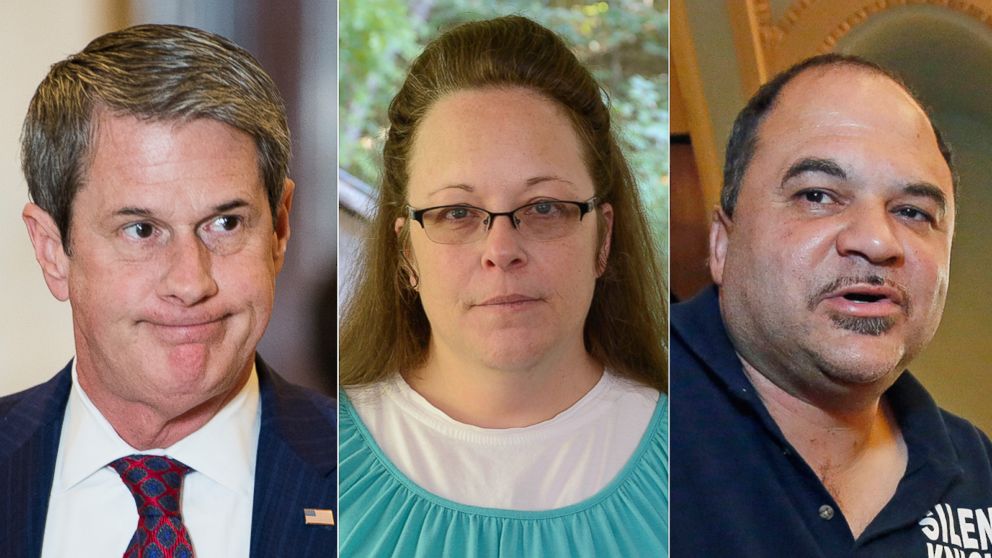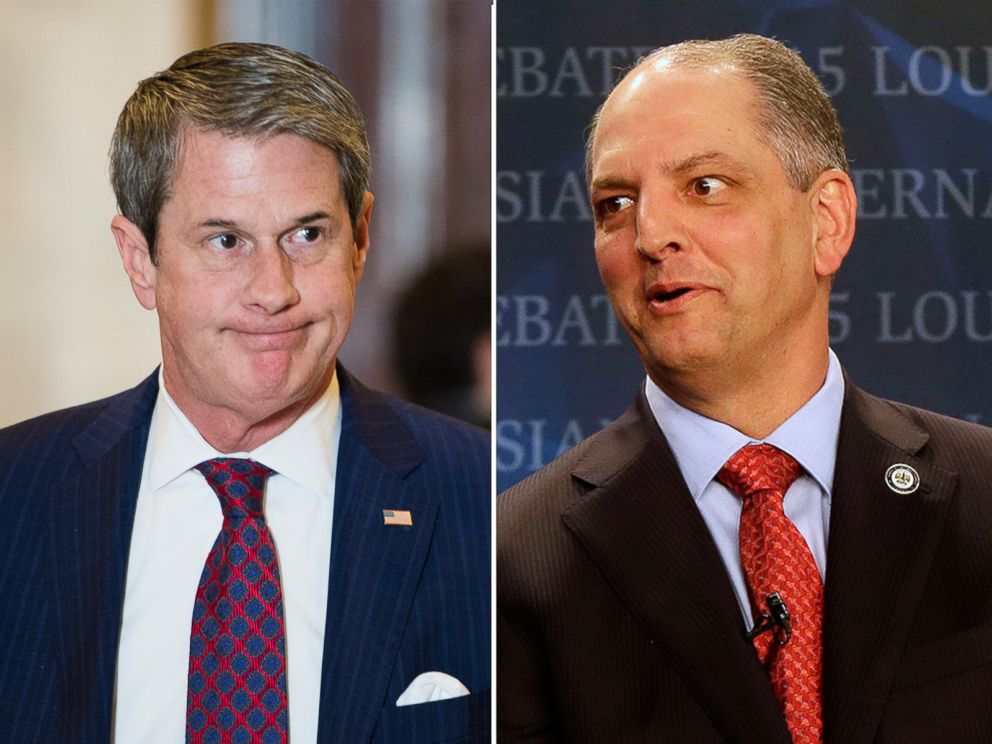How Kim Davis, David Vitter's Vices and a Big-Rig Trucker Could Steer the 2016 Conversation
How national issues are playing out in Louisiana, Kentucky and Mississippi.

— -- It may feel like the 2016 race to the White House has sucked all the oxygen out of politics. But the living, breathing state of smaller-scale politics is on full display in three governor’s races that have seen lively debates over immigration and gay rights, the scope of the federal government and the role of Confederate history in modern America.
Some of the same themes that have helped frame national conversations will appear on state ballots in coming weeks, with Louisiana casting a first round of votes Oct. 24, followed by Nov. 3 elections in Kentucky and Mississippi.
Will Bobby Jindal bashing and a tough stance on immigration play well with the Louisiana electorate? Do Kentucky voters see Rowan County Clerk Kim Davis as a symbol of religious liberty or a scofflaw who violated same-sex couples’ legal right to marry?
Will a conservative sweep in Mississippi put the nail in the coffin of Democratic politics in the American South? State voters will answer these questions not next year, but this week and next month, and variations on these themes are likely to permeate the 2016 conversation and beyond.
Here’s what to watch and everything you need to know in 2015 politics:

The Anti-Jindal Rumble in the Jungle:
LOUISIANA GUBERNATORIAL RACE
Under the rules of Louisiana’s unique gubernatorial process, known as the “jungle primary,” there is no party primary. Instead, all candidates, regardless of party affiliation, are placed on a single ballot, and assuming no candidate clears 50 percent of the vote, the top two vote-getters have a runoff.
That means Louisiana’s Oct. 24 Election Day probably won’t be the end of that story. Louisiana’s race has no incumbent because sitting governor and presidential hopeful Bobby Jindal is term-limited from the governor’s mansion. But the specter of Jindal’s deeply unpopular legacy looms large over the contest.
It’s something the 2016 presidential candidate doesn’t advertise on the campaign trail, but with local polls showing Jindal registering a dismal home-state approval rating, the competition to be seen by Louisiana voters as the least Jindal-esque is playing heavily in this fight. Jindal has been slammed for perceived fiscal mismanagement, with voters blaming him for inheriting a $1 billion budget surplus and leaving office with a projected $1.6 billion deficit. Front-runner U.S. Sen. David Vitter, a Republican, is leading State Rep. John Bel Edwards, a Demorcrat, and two trailing contenders, according to local polling.
Vitter confessed in 2007 to being a long-time client of Deborah Jeane Palfrey, the infamous “D.C. Madam,” who made millions arranging trysts for an upscale clientele in the nation’s capital (Vitter’s shameful chapter has been reprised in an attack ad). Despite a blemished record of his own, Vitter is hoping that campaigning on his contrasts with the tarnished sitting governor, including his openness to Medicaid expansion that Jindal shunned, will carry him to victory.
Kim Davis: Conscientious Objector or Scofflaw?:
KENTUCKY GUBERNATORIAL RACE
Kentucky’s Democrat Attorney General Jack Conway is in a tight race with businessman and Tea Party darling Matt Bevin, according to local polls.
Conway’s rival, businessman Matt Bevin, emerged as an ardent supporter of Kim Davis, and even engaged in a televised shouting match with CNN’s Don Lemon over the controversial clerk.
If his name sounds familiar it’s because you’ve heard it before: Bevin was Mitch McConnell’s primary opponent last year. They had a contentious primary battle, in which McConnell ended up easily beating the political novice, but not before Bevin angered establishment Republicans in the state and nationally. While Bevin’s plan to shut down Kentucky’s state-run health care exchange and eliminate Medicaid expansion conforms to mainstream Republican thinking, other positions are well outside party lines.
He believes the EPA has no authority over the states, and previously supported a push to legalize cockfighting (which he later denied.)
Democrats speculate Bevin’s fraught relationship with the GOP base explains the Republican Governors Association’s choice to stop running ads for him in September, which Bevin’s campaign hasn’t denied. The Tea Partier’s relationship to the establishment unraveled further when Bevin said during a radio interview that he would vote for Ben Carson over Kentucky’s native son Rand Paul—a slap in the faces of both Paul and McConnell, who’d previously endorsed Bevin and worked to rally the base around him.
Bevin quickly walked the statement back and Paul brushed the comment off, but the fracas appears to have increased tensions between Bevin and the party base. The right-wing candidate’s uneasy marriage to mainstream Republicanism is perhaps best captured in a quote by Larry Cox, the former state director for Mitch McConnell.
Asked by Cincinnati.com how he would vote on Nov. 3, Cox replied, “With reluctance.”
MISSISSIPPI GUBERNATORIAL RACE
The race for Mississippi governor pits Republican incumbent Gov. Phil Bryant against the Hail Mary campaign of Democrat Robert Gray, a genuine political unknown with zero governing experience. Gray, a shy big-rig trucker who uses the CB handle “Silent Knight” and lives with his mother, did not vote in the primaries, he says, because he was busy running errands and lost track of time.
WHY IT MATTERS
The Mississippi gubernatorial election has come to symbolize the nadir of Democratic sway in the American South after decades of decline. As the New York Times quoted one Mississippi Democratic insider: “The party that was once the alpha and omega of Southern politics is now having to explain that its headline candidate in Mississippi was elected on the following grounds: ‘He was the first name on the ballot, and he was a man.’”
Disillusioned Democrats also face the prospect that Mississippi Attorney General Jim Hood, dubbed the “last Democrat in Dixie,” could lose a tough reelection fight. Republicans, on the other hand, may find campaigning easier than governing. Last week saw hundreds march in Jackson, demanding that Mississippi’s state flag be redesigned without symbols of the Confederacy, a movement that grew out of the mass shooting in Charleston, S.C., perpetrated by a Confederate sympathizer. Gov. Bryant said the issue should be decided by voters rather than the state legislature.
But given Mississippi’s complicated initiative process, the earliest a flag redesign could appear on the ballot is 2018, which virtually guarantees the issue will continue to demand attention from the state’s next governor. With criminal justice reform emerging recently as an area of rare bipartisan agreement, governors of states like Mississippi, which has one of the highest incarceration rates in the U.S, may face mounting pressure to continue to act on the bedeviling issue, as Gov. Bryant has quietly done by reducing the inmate population by 3,000 people over the past several months.
Although Gov. Bryant’s long-odds challenge from surprise candidate Gray may sound like a bizarre anomaly, it’s not a first for Southern politics. Alvin Greene, another unknown, rocked the political world by winning South Carolina’s Democratic Senate primary race in 2010, spawning bemused New York Times headlines, “Who Is Alvin Greene?” and “Enigmatic Jobless Man Prepares Senate Campaign.”
By all accounts, however, Gray is expected to face a similar fate as Greene: trounced by a much more seasoned incumbent Republican rival.